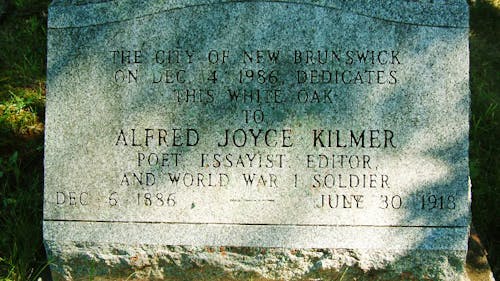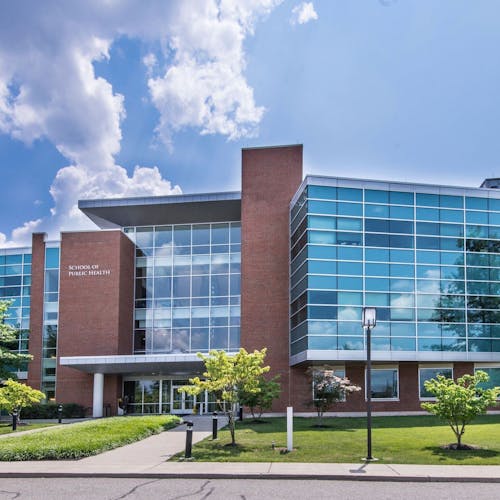Kilmer Oak Tree’s anniversary stirs local lore on notable poet

The Kilmer Oak Tree was cut down 50 years ago yesterday, taking with it many layers of local lore surrounding the notable poet Joyce Kilmer, who was born and raised in New Brunswick.
Following his graduation from Rutgers Preparatory School, Kilmer attended Rutgers University from 1904 to 1906.
Many believe a white oak tree that once towered over a corner of Douglass campus inspired his most famous work, said Joseph Florentine, the University director of Greenhouse Operations and Planning.
“Folklore has it that Joyce Kilmer had this tree in mind when he wrote his poem, ‘Trees,’” Florentine said.
Considered one of the most important American poets of his time, Kilmer honed his writing talents as an associate editor of the Targum while he was a student at Rutgers, Florentine said.
“The location of the original tree was by the School of Management and Labor Relations Building, near the Sears Shopping Center,” Florentine said. “There is a small stone monument at the site that was dedicated on the 100th anniversary of Kilmer’s birth.”
Kilmer died while serving in the U.S. Army during World War I. The monument serves as a memorial for a man who was both a Rutgers student and a patriot, Florentine said.
Despite the fame of the Kilmer Oak at Rutgers, a considerable debate exists over the location of the tree that inspired Kilmer.
Alex Michelini, the founder of the Joyce Kilmer Society of Mahwah, said “Trees” was written in and inspired by Mahwah, New Jersey in 1913.
“The old fable, that Kilmer was inspired by the oak tree at Rutgers, has long ago been discounted as well as [have] nearly a dozen other such claims,” Michelini said.
Michelini has conducted extensive research on the subject and believes that the University’s claims to the tree lack substantial evidence.
“A letter, which I discovered last May in the Georgetown University Library, written by Kilmer’s widow, specifically says ‘Trees’ was written in their Mahwah home in an upstairs room with a desk near a window looking ‘down a wooded hill,’” Michelini said.
Additionally, when the white oak was cut down Sept. 18, 1963, the New York Times reported that Rutgers had no proof of the tree’s significance to Kilmer’s popular poem, Michelini said.
“This further confirms that this attribution is unsubstantiated and [also] its dissemination within the realm of rumor and urban legend,” Michelini said.
Whether or not the Kilmer Oak is the tree Kilmer was inspired by, the original oak and its offspring are highly valued by many members of the Rutgers community, Florentine said. Descendants of the Kilmer Oak have been raised and lovingly cared for by generations of Rutgers faculty.
“The progeny of the Kilmer Oak living at Horticulture Farm 1 was planted by Dr. Elwin Orton, a well-known plant breeder, who is now retired,” Florentine said. “The late Dr. John Kuser, who was a professor in the Forestry Department, had given this seedling to Dr. Orton to plant.”
Though the stories surrounding the Kilmer Oak have proven problematic to some, Rutgers students remain ambivalent with regards to the future and past of the tree.
Shivani Mistry, a Rutgers Business School sophomore, is unconvinced of the value of commemorating a tree that may or may not have any significance to Joyce Kilmer’s life, especially when taking into consideration the cost of memorials and care for its offspring.
“Depending on how much time and money it would take, I think it may still be worth it to commemorate the tree,” Mistry said.
Florentine encourages people to view the Kilmer Oak’s progeny by visiting Horticulture Farm 1’s Display Gardens. He also said that is a second mature seedling from the Kilmer Oak exists by the split in Lipman Drive on Douglass campus.
Wooden gavels made from the original tree in 1966 also represent its legacy. The Alumni Association currently holds them, Florentine said.
Regardless of the significance of the oaks’ present or past to Kilmer’s literary career, they remain important to many people on campus. The trees are loved and remembered by the University, Florentine said.
As Kilmer put it: “I think that I shall never see / A poem lovely as a tree.”



